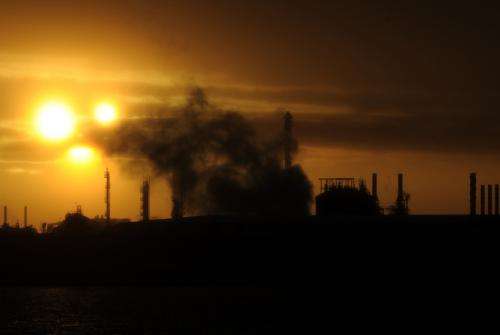World falling far behind on two-degree climate goal

The world is falling far behind in its bid to curb greenhouse emissions enough to limit global warming to 2C, according to two new reports.
For the sixth year running, the world has failed to meet the necessary "decarbonisation" targets, according to an analysis compiled by PwC.
Greenhouse emissions per unit of gross domestic product fell by 1.2% in 2013, the report shows. While that is ahead of the post-2000 average of 0.9%, it's a long way short of the 6% needed, the report said.
The result is that the global economy now needs to decarbonise by 6.2% a year, more than five times faster than the current rate, every year until 2100 if it is to stay within the "carbon budget" estimated by the Intergovernmental Panel on Climate Change (IPCC).
"On our current burn rate we blow our carbon budget by 2034, 66 years ahead of schedule. This trajectory, based on IPCC data, takes us to four degrees of warming by the end of the century," the report said.
It offered some grounds for optimism, however, with the "E7" group of emerging economies such as China, India and Brazil decarbonising faster than the G7 established nations for the first time. Renewable energy also now represents 22% of world electricity supply.
Nevertheless, the report said there is still a "gigatonne gap" between governments' current carbon-reduction pledges and what will be needed to limit overall warming to 2C.
Delivering on current policies would only succeed in reining warming back from 4C to 3C, it predicted. The United Nations' New York 2014 and Paris 2015 climate summits will be crucial in securing an improved deal, the report said.
The warning comes as the World Meteorological Organisation's annual Greenhouse Gas Bulletin shows that atmospheric carbon dioxide concentrations have now reached 396 parts per million, a jump of 42% since pre-industrial times.
Carbon dioxide levels climbed by 2.9 ppm from 2012 to 2013, the largest year-on-year change seen in records going back to 1984.
Rising atmospheric carbon dioxide concentrations are not surprising, said Michael Raupach, director of the Australian National University's Climate Change Institute.
Despite reductions in emissions per unit of GDP, total emissions are estimated to have risen by about 2% in 2013 because of economic growth.
The figures are "another reminder that rapid, strong emissions reductions are needed if global warming is to be kept below a limit around 2C above pre-industrial temperatures," Professor Raupach said.
Oceans acidifying
The WMO's report also warned of increased carbon dioxide uptake by oceans. Over the past two decades, this has caused the oceans to acidify by an average of 0.001-0.002 pH units per year.
The oceans will continue to acidify because of the time lag in how they absorb carbon dioxide, said Will Howard, a researcher at the University of Melbourne.
"The processes by which the ocean buffers CO2 have time-scales ranging from decades to millennia, so we are committing ourselves to further acidification of the oceans and "saturation" of ocean uptake. We can already see impacts of ocean acidification on marine organisms, with still-unpredictable effects on ecosystems and their services," he said.
"We are increasing the atmospheric concentration of carbon dioxide about 100 times faster than any time in the past 800,000 years, possibly outstripping the ability of natural systems to respond."
Professor Raupach said that "carbon sinks" such as forests and oceans are failing to keep pace with rising atmospheric carbon dioxide concentrations.
"A progressively greater fraction of carbon dioxide emissions are ending up in the atmosphere. It is a sign that the efficiencies of the all–important land and ocean carbon dioxide sinks are weakening," he said.
More information: The report is available online: www.pwc.co.uk/assets/pdf/low-c … onomy-index-2014.pdf
Source: The Conversation
This story is published courtesy of The Conversation (under Creative Commons-Attribution/No derivatives).
![]()



















